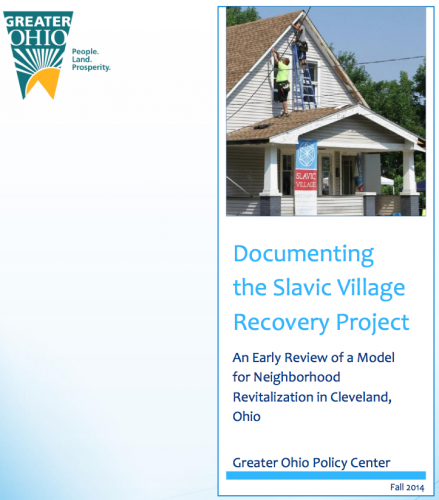Greater Ohio Policy Center released an independent analysis of an innovative model for neighborhood recovery being piloted in a Cleveland neighborhood, finding promising results for this block-by-block holistic approach to revitalization that combines demolition and rehabilitation.
Slavic Village Recovery, LLC (SVR), a for-profit entity consisting of four partners, was created for the purpose of revitalizing the neighborhood of Slavic Village. Through a targeted investment strategy, the SVR partners intend to take a ―holistic approach to community redevelopment, aligning demolition and rehabilitation to eradicate blight one block at a time and supplementing its efforts with community engagement by the local community development corporation (CDC) and corporate volunteerism by the for-profit partners. It is focused on gaining access to a critical mass of real-estate owned (REO) properties and bank walkaways with the intention of either demolishing or rehabilitating the vacant structures.
Slavic Village, a culturally-rich, working-class neighborhood south of downtown Cleveland, is not one of Cleveland‘s most distressed areas. In fact, given its strong community institutions, diverse residents, and a very active CDC, the SVR partners recognized it as a promising opportunity for revitalization. However, the neighborhood also experienced the highest foreclosure rate in the country during the height of the housing crisis.
One year after the launch of the SVR Project, Greater Ohio Policy Center was tasked with documenting the model and providing recommendations regarding its potential replication in other neighborhoods. GOPC completed interviews with stakeholders and supplemented the research with available data. This report details the Slavic Village Recovery Project pilot project to date, captures some early positive indicators, outlines considerations and recommendations for possible replication, and offers recommendations for strengthening the program and increasing the potential for its future sustainability.
The document summarizes preliminary results for the Slavic Village Recovery Project, including:
- Sales prices of the initial homes reached the targeted amount necessary to cover rehab costs and make a small $5,000-$10,000 profit; received an appraisal value above the listed $60,000 sale price; and sold quickly.
- Neighborhood morale is high and neighbors are positive about the project.
- Investment is taking place in the neighborhood apart from direct involvement with SVR, suggesting, perhaps, that SVR’s private sector partners created market confidence for new businesses and city and regional governments.
The Study also noted several keys to SVR’s early successes:
- A holistic approach to community development and a clear comprehensive plan, strategically linking demolition and rehabilitation.
- A focus on properties with value and the strong relationships needed to acquire properties from REO lists and banks
- A philanthropic mission paired with a for-profit approach in executing the mission
Download the report
Contents:
1. Introduction
2. Background and Neighborhood Selection
3. The Partners
4. The SVR Revitalization Model Implementation Steps
5. Early Positive Indicators
6. Key Success Factors of the Model
7. Considerations for Replication or Expansion of the Model





